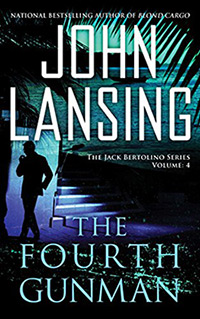This week, I’ve invited my good friend John Lansing to do a guest post. Before writing his best-selling Jack Bertolino series, he started out as an actor in New York City, performing the lead in the Broadway production of Grease at the Royale Theatre before putting together a rock ‘n’ roll band and playing the iconic club CBGB.
After heading to the West Coast, he landed a co-starring role in George Lucas’ More American Graffiti, and guest-starred on numerous television shows.
During his lengthy writing career, John wrote and produced Walker Texas Ranger, co-wrote two CBS Movies of the Week, and co-executive produced the ABC series Scoundrels. His first book was Good Cop Bad Money, a true crime tome he co-wrote with former NYPD Inspector Glen Morisano. He followed it with the Bertolini novels: The Devil’s Necktie,, Blond Cargo, Dead is Dead, and The Fourth Gunman. John now resides in Los Angeles, and we’re fortunate to have him here. — Dietrich
John: My father was first generation Italian American, my mother, first generation Polish American. They met and married post World War II, and because of the discrimination their parents suffered, they were all about assimilation. Dad didn’t speak Italian at home, and Mom never uttered a word in Polish. And after living on spaghetti every day of his childhood, my father vowed never to eat pasta again. We were American’s and ate American food.
Dad was one of seven brothers and sisters, and my culinary life changed the first time I went to a Sunday dinner at his sister’s house in Floral Park. I stepped past the door into Aunt Mary, and Uncle Chip’s home and was grabbed by the most wonderful scent I’d ever experienced and would never forget.
Unlike my father, Aunt Mary kept the old recipes alive. There were two major pots of sauce simmering on the stove, one filled with meatballs, the other with sausage. The entire table was covered with homemade pasta noodles drying on flattened brown paper bags. Chip’s father was sitting at the table with a gallon jug of red wine under his chair that he’d tip into a jelly jar and partake throughout the day.
Uncle Chip assembled the most wondrous antipasto I’d ever seen. The base of the salad was diced celery and onions, dressed with olive oil and red wine vinegar, covered in salami, prosciutto, provolone cheese, pickled peppers, artichoke hearts, pepperoni, anchovies and olives.
Are you kidding me? One bite of Mary’s meatballs and I was in heaven. How could my dad have ever given this up?
I learned how to cook Italian from Chip and Mary as the years went on. How not to over-mix the beef, veal, pork, egg, onion, garlic and Parmigiano Reggiano cheese for my meatballs to keep them light and flavorful. To use torn white bread soaked in milk instead of dense, dried bread crumbs. And I discovered, doing my own research, that by poaching the meatballs in the sauce, instead of pan frying them first, they became so light, they floated.
Years later, when I wrote my first novel, The Devil’s Necktie, the protagonist’s last name was Bertolino, and the foods he loved to eat came from my own experience.
Jack Bertolino was a decorated Inspector with the NYPD standing at the cross-roads. After taking a bullet wound to the back, and six months of painful rehab, he turned in his badge, not willing to become a decorated desk jockey. He suffered a contentious divorce, that left his relationship with his son in shambles. Jack accepted full responsibility and vowed to make things right.
When his son won a baseball scholarship to Stanford, Jack packed his belongings and moved into a loft in Marina Del Rey, California. Close enough to try and mend their relationship, but not close enough to be annoying.
The loft had a balcony reminiscent of old New York City buildings and was in a mixed-usage neighborhood. One of the first things Jack purchased was a gas grill and two tomato plants that he set up on the balcony. Jack enjoyed his wine, but wasn’t a big drinker. When life got him down, he’d put on a red sauce. As soon as the tomatoes ripened they’d go into his pot. Until that time, he discovered the nearest Italian deli, and stocked up.
It was a simple sauce he loved. San Marzano whole canned tomatoes, garlic, onions, salt and pepper, fresh basil, dried oregano, extra virgin olive oil, red-pepper flakes and Pecorino Romano cheese. As soon as the garlic and onions hit the sizzling oil, and the scent filled the room, his heart rate ticked down a few notches. Jack let the garlic and onions cook until translucent, then he hand squeezed the tomatoes into the pot and gave them a stir. He added the red pepper, tore a few leaves of basil and dropped them into the pot before adding a pinch of dried oregano. He salted and peppered to taste. As soon as the sauce came to a rolling boil, he turned the heat to simmer, poured a glass of cabernet, and tossed a few picante Italian sausages onto the grill. The spaghetti would be DeCecco, because it held a good al dente. Firm, just the way he liked it.
While Jack waited for the salted water to boil, he watched a string of jets cross the sky, reflecting silver off the setting sun as they came in for their final approach to LAX. Jack had to smile. Things were starting to look up. A well-deserved feeling of peace washed over him.
And then his cell phone chirped.
Dietrich: Thanks to John Lansing for dropping in. Fans of his work can find out more about him and his books at his website here.









































